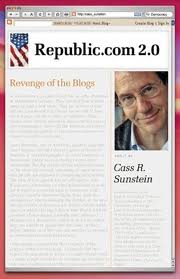Archive
BLOG 10: Sunstein’s Republic.com 2.0
REVIEW
In my opinion, Cass Sunstein’s Republic.com 2.0 is much too repetitive for any average (or even scholarly) person to enjoy reading. Sunstein draws some meaningful conclusions from his theories about the implications of new and emerging technologies and information communication and what this means for free speech and democracy, but by the end of the book (if the reader can make it to the end of the book) the same theories and conclusions have been re-stated so many times that upon finishing the book the reader may never want to hear of Sunstein or his theories again. Perhaps the reason for all the repetition though is to clearly state how new technologies are changing the way people and communicate information and the consequences of these changes for our democratic system. After all, that is in extremely important, relevant, and (usually) interesting topic.
KEY POINTS & Quotes
The main points Sunstein makes in Republic.com 2.0 (which become apparent within the first few chapters of the book) are:
1. Citizens should be exposed to info that they would not seek out themselves.
“I do contend that in a democracy deserving the name, lives should be structured so that people often come across views and topics that they have not specifically selected.“
2. Citizens need range of common, shared experiences so they can understand each other.
“I will emphasize the risks posed by any situation in which thousands or perhaps millions or even tens of millions of people are mainly listening to louder echoes of their own voices. A situation of this kind is likely to produce far worse than mere fragmentation.“
Highs and Lows
The best part of the Sunstien book was the end. Just kidding. The actual best part of Republic.com 2.0 was learning about the important and major implications our new technologies and communication methods have for our society and our democracy. I don’t think many people think about how increased dependence on sharing and getting information through social media and other personalized, on-line sources can make a difference in the democratic values held by our society. In reverse, I don’t think many people often think of a democratic society’s responsibility to create a media/information environment that is healthy for democracy. Sunstein certainly provides many points that should be considered as our society moves toward increased reliance on technology and ‘personalized’ information. The worst part of the book was definitely the repetition. If Sunstein would have written Republic.com 2.0 in a more succinct fashion the book, full of all his theories, conclusions, and recommendations for society, would be both important and interesting.
More reviews on Sunstein’s Republic.com 2.0 HERE
Blog 10: Republic.com 2.0
Cass Sunstein’s book, Republic.com 2.0, was a very interesting read. To me it really reinforced a lot of the ideas and topics that we’ve touched on in class and the ideas that I already had a good grasp on. Just like I always like to do, I compared this book to the sporting world (obviously something that I have more knowledge in). And when I did, everything made a lot of sense, but there were definitely a few things that I didn’t necessarily agree with.
This short clip talks about how personalization makes life easier for us through conversion. I thought some of the point that were brought up were really though provoking. It is a little dorky but puts this idea into a different perspective.
In one chapter Sunstein talks about polarized blogs and claims that conservatives will only read conservative blogs and vice versa. This made me think a little…Obviously I’m going to be more inclined to read a sports blog than a political blog, which I guess is a like-minded decision, but as you break it down even further I’ll read blogs that have a different opinion than I do. I really feel like I go about it in that way so that I can get even more heated about what I’m trying to argue about! So I guess you could say that I go into those foreign blogs with a close mind, but I do stumble upon them!
The thing that I really liked about this book was how he talked about how personalized we can make our information consumption. He’s absolutely right with this idea…take a look at your bookmarks on your computer, this is definitely personalized. I’m not going to put a bookmark for a site that I wouldn’t frequent on a daily basis (side note: when I got my computer it came installed with bookmarks…I got rid of all of them). I absolutely love the idea of personalization, I sure don’t want to waste my time going through websites that I don’t necessarily care for in order to find something that I do care for! I’m a college student with a lot of other responsibilities, it’s all about being able to manage my time, right?!
So that was something that I agreed with, that you can personalize practically everything that you’d like to, but I don’t agree with a part of it. All the websites that I go to have links to different stories and websites. A couple nights ago I got caught up in clicking on links from website to website. I started out reading an article on espn.com and ended up on a democratic website…all without ever typing in anything, just by massive amounts of mouse clicks! So I feel like I could argue that I ran across websites and articles that I didn’t really have any interest in but then I actually think deeper into it and it was a personalized journey through the internet world because I controlled the clicks…so I guess I just ran full circle right there!
Another thing that I didn’t necessarily like about the book was how redundant it was. I feel like you could’ve read the first chapter and really gained the same amount of information as someone who read the whole book. I guess the chapters just became very predictable to me.
I don’t think I would recommend this book to anyone else because I feel as if most people already understand most of the concepts that are covered in this book!The people that I would recommend this book to would be the citizens who oppose the fact of personalization. But if you would like to purchase the book, click here!

